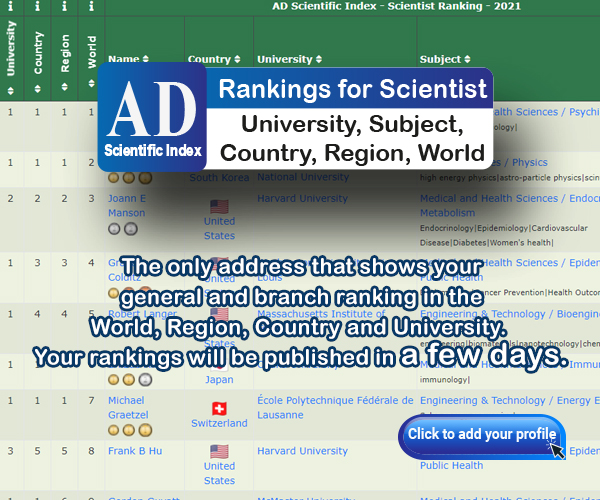Methodology
Ranking academic journals according to the impact factor is a practice that started many years ago. The need to access
scientifically valuable studies within limited time frames or the need to find scientists working in a certain field has led to the procedure
of ranking scientists and scientific studies. For this purpose, many scoring systems such as the h-index, i10 index, g-index, m-index,
the Erdös number, tori index, riq index, and read-10 index have been studied as numerical indicators showing how productive and
effective a researcher is. Each of these systems has many advantages as well as disadvantages. Of the abovementioned indexes, the
most accepted one is the h-index. The h-index is determined based on the number of articles cited at least h times. In order to
achieve a high h-index, an academician must have a high number of articles published and have received a high number of citations.
For example, an h-index value of 15 indicates that the academician has received at least 15 citations to each of the 15 articles
published. In order to increase the h-index value from 15 to 16, the same academician should receive at least 16 citations to the
published 16 papers. To find the h-index value, several databases can be used including Google Scholar, Web of Science, Scopus,
and Publons, some of which are public or require a subscription. In the calculation of h-indexes, such databases use different
parameters including SCI-E or indexed journals or non-indexed auxiliary elements such as other journals, books, or patents. Because
the set of parameters used by each database are different from those used by others, each database may calculate different h-index
values. Therefore, h-indexes calculated by each of the Google Scholar, Web of Science, Scopus, and Publons databases may be
different for the same researcher. For example, a researcher, who has authored several books more than scientific papers, may
receive a low h-index score in the Web of Science despite a high number of citations received. Neither of these indexes is equivalent
to the other because of differences in their scopes.
Having a large number of publications indicates that the researcher is productive, but data alone may not be the actual
indicator of the success of the researcher. For example, a researcher may have 10 publications that have received 400 citations. We
can argue that this researcher is more successful than a researcher having more than a hundred published papers that received, let’s
say, 200 citations. Besides, some valuable studies may not have been attributed the actual value they deserved because of various
reasons such as the failure of the use of adequate methods that would enable easy accessibility through scientific channels. The high
number of the use of papers as references by other authors shows the value and extent of contribution to the scientific literature.
The i10-index is another academic scoring system, in which the scores are calculated by Google Scholar. In this scoring system,
only scientific studies such as articles and books that have received 10 or more citations are taken into consideration. The number
of studies that have been cited ten or more times yields the i10-index value. The i10 index and the h-index values calculated for the
last five years do not show that the article was written and published in the last 5 years. Instead, these values show the citation
power in the last 5 years, indicating whether the paper is still effective.
Google Scholar provides both the total values of the i10-index, the h-index, and citation numbers along with the last 5 years’
values through a system based on the voluntariness principle. In this system, scientists create their accounts, select their papers,
and upload the selected papers onto the system. This service does not require a password and is free of charge. Here, we introduce
a newly developed index that we have developed based on the public Google Scholar profiles of scientists. We named this new system
the “AD Scientific Index”, which we have developed through robust intellectual infrastructure and maximum efforts aiming to
contribute to global scientific efforts.





